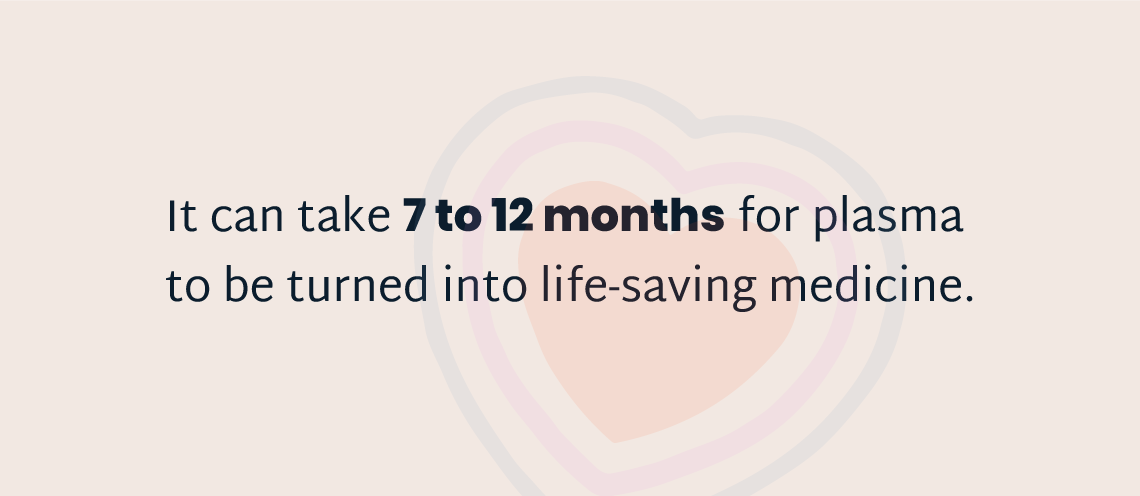Why Donate Plasma? 8 Reasons to Give
As you think about ways to give back this holiday season, don’t forget the impact of donating plasma. Discover eight important reasons to donate today.

Plasma donations save lives and are needed now more than ever. According to the American Red Cross, an average of 10,000 units of plasma are needed daily in the United States alone.
In this article, we'll outline eight reasons why you should consider becoming a plasma donor.
1. Earn Money While Making an Impact
Unlike whole blood donations, which are not compensated, plasma donors can receive payment for their time. As a plasma donor, you can donate up to two times in a seven-day period as long as you take 24 hours in between donations.
At Parachute, this can easily add up to $80 per week and $4,000 in a year.
It's worth noting that not every donation center offers compensation for plasma. You'll want to check with your local plasma donation center to confirm what their policies are. For instance, if you are donating convalescent plasma at a hospital or blood drive to help COVID-19 patients, you will likely not receive any payment.
2. Plasma Cannot Be Produced Synthetically
Because plasma cannot be produced synthetically in a laboratory, doctors rely on the generosity of donors to help treat and prevent life-threatening diseases and conditions. For many patients, plasma is the only treatment available.
3. Plasma Treats Primary Immunodeficiencies
Plasma is used to create medicine for a variety of conditions and illnesses. The largest class of diseases that plasma treats are immune-related disorders. There are hundreds of primary immunodeficiency disorders (PI), and plasma derived therapies are the leading treatment.
Patients with primary immunodeficiency disorders are more susceptible to infection and autoimmune disorders. Plasma protein therapies contain antibodies, which can help boost the immune system, allowing people to live more comfortably, safely, and independently.

4. Plasma Helps Those With Alpha-1
Plasma donations can also help those with alpha-1 antitrypsin deficiency (Alpha-1), which is an inherited condition that can lead to potentially life-threatening lung and liver diseases, including emphysema.
Individuals with alpha-1 are deficient in a plasma protein known as alpha-1 antitrypsin. The only treatment currently available for alpha-1 is augmentation therapy, which is a weekly plasma-derived infusion.
5. Plasma Protects Against Disease and Helps Pregnant Women
Convalescent plasma therapy uses blood from people who've recovered from an illness to help others recover. It contains specific antibodies, which can protect individuals from disease and infection. Convalescent plasma has been used to treat hepatitis B patients as well as organ transplant recipients.
Plasma can also help prevent hemolytic disease of the newborn (HDN), which is a blood disorder that occurs when the blood types of a mother and baby are incompatible.
If the blood types are incompatible, the mother's immune system creates antibodies that could attack the baby's red blood cells during a future pregnancy. Plasma from individuals with Rh-positive blood can help protect pregnant mothers and their babies from complications.
6. Plasma Assists With Blood Clotting and Those with Serious Injuries
Some individuals live with bleeding disorders that prevent the red cells in their blood from clotting properly. Two of the better-known bleeding disorders are hemophilia and Von Willebrand disease. In these cases, even the most minor injuries could result in fatal bleeding.
Because plasma contains blood clotting factors, plasma transfusions can help patients' blood clot properly.
7. There Is an Urgent Need for Plasma
There is currently an acute shortage of plasma, which puts patients in an especially vulnerable position. This emergency shortage is largely due to a decline in donations during the COVID-19 pandemic. Since it can take between 7-12 months for plasma to be turned into medicine, we have not yet felt the full impact of this shortage.

8. Donating Plasma Only Takes 1 Hour
Another upside to donating plasma is that it's a relatively low time commitment. Donations take about an hour, during which, you can relax, listen to a Podcast, or catch up on emails.
Why Donate Plasma Today?
Whether you're motivated by helping others or would like to earn a little extra for the things that matter, becoming a plasma donor can benefit you as well as the patients you help.
If you're planning to donate for the first time, you can read more about what to expect from your first visit here.
This article is for informational purposes only. It is not, nor is it intended to be, a substitute for professional medical advice, diagnosis, or treatment and should never be relied upon for specific medical advice.
